#anti kataang
Explore tagged Tumblr posts
Text
I got back into ATLA, and I've gotta talk about how Aang may have wanted Katara, but he needed Toph.
Aang needed someone who would challenge him, not someone who would be his "safe haven". While Katara often coddled/mothered Aang, Toph was always his equal. The two of them could have fun together without the mother-son/big sister-little brother undertones Kataang had. Katara always sheltered Aang, which is why he never grew and developed as a character, not even as an adult. If Toph saw Aang emotionally neglect two of their three kids because only one was an Airbender, she would have, 100%, put him back in his place because she never sugar-coated ANYTHING and faced problems head-on.
THIS is who I wanted Aang to end up with. Toph might not have been the one he wanted, but she was the one he needed.
These two were made for each other, just like Zuko and Katara (the two characters with the strongest emotional connection in the entire show, who understood one another like no one else + let's not forget all the romantic coding, thematic significance and symbolism that their dynamic is full of)
#atla#avatar the last airbender#aang x toph#toph x aang#taang#zutara#anti kataang#i will die on this hill#these two pairings make so much LOGICAL SENSE
156 notes
·
View notes
Text
I don't need canon to support my ship but it's always vindicating to see the receipts when antis spew their crap.
"Eww...Zuko and Katara are like siblings. Why would you ship them?"
Yeah...because siblings are often used for ship baiting





Meanwhile Kataang...

But Zuko and Katara are supposed to be the ones with the siblings vibes?


357 notes
·
View notes
Text




I bet whoever made this is a Kataang shipper, I have seen this trend starting where some Kataang shippers now act like Zuko didn’t really change for the better and will talk about how he is so much like his father. Funny how before everyone agreed that Zuko had an amazing redemption arc, but now that some Kataang shippers see him as a threat to his OTP, they act like he didn’t go through a redemption arc.
25 notes
·
View notes
Text
Katara's Story Is A Tragedy and It's Not An Accident
I was a teenaged girl when Avatar: The Last Airbender aired on Nickelodeon—the group that the show’s creators unintentionally hit while they were aiming for the younger, maler demographic. Nevermind that we’re the reason the show’s popularity caught fire and has endured for two decades; we weren’t the audience Mike and Bryan wanted. And by golly, were they going to make sure we knew it. They’ve been making sure we know it with every snide comment and addendum they’ve made to the story for the last twenty years.
For many of us girls who were raised in the nineties and aughts, Katara was a breath of fresh air—a rare opportunity in a media market saturated with boys having grand adventures to see a young woman having her own adventure and expressing the same fears and frustrations we were often made to feel.
We were told that we could be anything we wanted to be. That we were strong and smart and brimming with potential. That we were just as capable as the boys. That we were our brothers’ equals. But we were also told to wash dishes and fold laundry and tidy around the house while our brothers played outside. We were ignored when our male classmates picked teams for kickball and told to go play with the girls on the swings—the same girls we were taught to deride if we wanted to be taken seriously. We were lectured for the same immaturity that was expected of boys our age and older, and we were told to do better while also being told, “Boys will be boys.” Despite all the platitudes about equality and power, we saw our mothers straining under the weight of carrying both full-time careers and unequally divided family responsibilities. We sensed that we were being groomed for the same future.
And we saw ourselves in Katara.
Katara begins as a parentified teenaged girl: forced to take on responsibility for the daily care of people around her—including male figures who are capable of looking after themselves but are allowed to be immature enough to foist such labor onto her. She does thankless work for people who take her contributions for granted. She’s belittled by people who love her, but don’t understand her. She’s isolated from the world and denied opportunities to improve her talents. She's told what emotions she's allowed to feel and when to feel them. In essence, she was living our real-world fear: being trapped in someone else’s narrow, stultifying definition of femininity and motherhood.
Then we watched Katara go through an incredible journey of self-determination and empowerment. Katara goes from being a powerless, fearful victim to being a protector, healer, advocate, and liberator to others who can’t do those things for themselves (a much truer and more fulfilling definition of nurturing and motherhood). It’s necessary in Katara’s growth cycle that she does this for others first because that is the realm she knows. She is given increasingly significant opportunities to speak up and fight on behalf of others, and that allows her to build those advocacy muscles gradually. But she still holds back her own emotional pain because everyone that she attempts to express such things to proves they either don't want to deal with it or they only want to manipulate her feelings for their own purposes.
Katara continues to do much of the work we think of as traditionally maternal on behalf of her friends and family over the course of the story, but we do see that scale gradually shift. Sokka takes on more responsibility for managing the group’s supplies, and everyone helps around camp, but Katara continues to be the manager of everyone else’s emotions while simultaneously punching down her own. The scales finally seem to tip when Zuko joins the group. With Zuko, we see someone working alongside Katara doing the same tasks she is doing around camp for the first time. Zuko is also the only person who never expects anything of her and whose emotions she never has to manage because he’s actually more emotionally stable and mature than she is by that point. And then, Katara’s arc culminates in her finally getting the chance to fully seize her power, rewrite the story of the traumatic event that cast her into the role of parentified child, be her own protector, and freely express everything she’s kept locked away for the sake of letting everyone else feel comfortable around her. Then she fights alongside an equal partner she knows she can trust and depend on through the story's climax. And for the first time since her mother’s death, the girl who gives and gives and gives while getting nothing back watches someone sacrifice everything for her. But this time, she’s able to change the ending because her power is fully realized. The cycle was officially broken.
Katara’s character arc was catharsis at every step. If Katara could break the mold and recreate the ideas of womanhood and motherhood in her own image, so could we. We could be powerful. We could care for ourselves AND others when they need us—instead of caring for everyone all the time at our own expense. We could have balanced partnerships with give and take going both ways (“Tui and La, push and pull”), rather than the, “I give, they take,” model we were conditioned to expect. We could fight for and determine our own destiny—after all, wasn’t destiny a core theme of the story?
Yes. Destiny was the theme. But the lesson was that Katara didn’t get to determine hers.
After Katara achieves her victory and completes her arc, the narrative steps in and smacks her back down to where she started. For reasons that are never explained or justified, Katara rewards the hero by giving into his romantic advances even though he has invalidated her emotions, violated her boundaries, lashed out at her for slights against him she never committed, idealized a false idol of her then browbeat her when she deviated from his narrative, and forced her to carry his emotions and put herself in danger when he willingly fails to control himself—even though he never apologizes, never learns his lesson, and never shows any inclination to do better.
And do better he does not.
The more we dared to voice our own opinions on a character that was clearly meant to represent us, the more Mike and Bryan punished Katara for it.
Throughout the comics, Katara makes herself smaller and smaller and forfeits all rights to personal actualization and satisfaction in her relationship. She punches her feelings down when her partner neglects her and cries alone as he shows more affection and concern for literally every other girl’s feelings than hers. She becomes cowed by his outbursts and threats of violence. Instead of rising with the moon or resting in the warmth of the sun, she learns to stay in his shadow. She gives up her silly childish dreams of rebuilding her own dying culture’s traditions and advocating for other oppressed groups so that she can fulfill his wishes to rebuild his culture instead—by being his babymaker. Katara gave up everything she cared about and everything she fought to become for the whims of a man-child who never saw her as a person, only a possession.
Then, in her old age, we get to watch the fallout of his neglect—both toward her and her children who did not meet his expectations. By that point, the girl who would never turn her back on anyone who needed her was too far gone to even advocate for her own children in her own home. And even after he’s gone, Katara never dares to define herself again. She remains, for the next twenty-plus years of her life, nothing more than her husband's grieving widow. She was never recognized for her accomplishments, the battles she won, or the people she liberated. Even her own children and grandchildren have all but forgotten her. She ends her story exactly where it began: trapped in someone else’s narrow, stultifying definition of femininity and motherhood.
The story’s theme was destiny, remember? But this story’s target audience was little boys. Zuko gets to determine his own destiny as long as he works hard and earns it. Aang gets his destiny no matter what he does or doesn’t do to earn it. And Katara cannot change the destiny she was assigned by gender at birth, no matter how hard she fights for it or how many times over she earns it.
Katara is Winston Smith, and the year is 1984. It doesn’t matter how hard you fight or what you accomplish, little girl. Big Brother is too big, too strong, and too powerful. You will never escape. You will never be free. Your victories are meaningless. So stay in your place, do what you’re told, and cry quietly so your tears don’t bother people who matter.
I will never get over it. Because I am Katara. And so are my friends, sisters, daughters, and nieces. But I am not content to live in Bryke's world.
I will never turn my back on people who need me. Including me.
#ATLA#Avatar the Last Airbender#Katara#Anti Bryke#Zutara#but not really#just pro-Katara#Anti Kataang
3K notes
·
View notes
Text
No amount of "She wanted to lay-low after the war" will justify whatever the heck happened to Katara in TLOK
"She doesn't have enough reason to have a statue" And the cabbage man has?
"She wanted to focus on her children" They managed to portray Zuko a good father because of how well his children has turned out while being the freaking firelord. I don't know what's stopping the writiers from doing the same to Katara.
"She wouldn't wanted to involve herself in politics" Did we all watched ATLA????
If you think reviving the Avatar, who, if you're not aware died during the Avatar State, is not enough of a reason to even RECOGNIZE Katara's contributions, I think you need to freaking rewatch ATLA and realize how much they downgraded her in TLOK

554 notes
·
View notes
Text
when i got on twitter and said if katara had killed yon rha, zuko’s opinion of katara’s core character wouldn’t have changed (we even see that the split second shot of him seeing her blood bend) but aang’s would have- THEY NAILED ME TO THE FUCKING STAKE YALL! they hated jesus because he told the truth!
#I am absolutely not wrong#everyone on twitter is so stupid and I’m right and that’s just the truth#like aang looks at katara through rose tinted glasses and when he shows who she really is he backtracks#katara intentionally does not show that side to him and even said out her own mouth she knew he’d never understand#zk you guys will always be the better ship#I will not change my stance on that#zuko#katara#zutara#atla#anti kataang#look I’m tagging correctly guyssssss
995 notes
·
View notes
Text
you know what, i still find it beyond weird that atla — the poster show for championing cross-cultural harmony and finding similarities in differences — chose to have katara and aang’s cultures remain not only diametrically opposed but separate throughout the entirety of its three seasons.
you’d think for a story all about understanding and respecting different backgrounds that its main romantic relationship would exemplify that, right? why don’t katara and aang ever bond over similarities in their cultures? why is their huge shared trauma of being genocide survivors forced to carry the legacy of their lost people just brushed under the rug and never talked about, even between the characters themselves? why go out of your way to establish that everything from their food to their sense of community to their moral values are so disparate? why was there never a moment where they found consensus on any of these things, or learned to love each other’s heritage despite those differences?
or if i’m getting to the actual point, why did we never have aang learning to appreciate katara’s culture?
i get that it was supposed to be humorous but it isn’t funny that the only times aang refers to katara’s cultural…anything is either as a joke or with disrespect. he jokes about her food being disgusting twice — once to toph (when she’s trying food made by a genocide survivor who is singlehandedly keeping her people’s culture alive in the land that tried to wipe it out, no less) shows no consideration for the fact that her morals don’t, and have no need to, adhere to those of the air nomads, and honestly is just downright insensitive to bato, sokka and katara in the entirety of bato of the water tribe.
i’m not saying you have to love everything about your partner’s culture, but aang doesn’t seem to love, learn from, or find value in anything. and it would be one thing for him to all but ignore his future wife’s heritage, but another entirely for him to treat it with such condescending superiority — especially when katara has never done the same. why would you make any of these writing choices when they so flagrantly contradict the themes of your story?
in the meantime, the country they do choose to show has cultural similarities with the water tribes in terms of both diet and community is — go figure — the fucking fire nation. oh yeah, there’s definitely nothing to read into there. no implications at all :)
be fucking fr, man.
#anti kataang#zutara#not explicltly but yk what i’m saying#kat.aang truly has abt as much thematic relevance as a rock
592 notes
·
View notes
Text
”Aang is the one who reminds Katara to be a kid” PUT SOME RESPECT ON TOPH’S NAME!!! Toph brings out Katara’s inner child, not the sunshine rainbow flower crown inner child, but her internal gremlin. Her pettiness and violence and self-centered mischief. Aang is a ride-or-die friend sometimes, but when they’re together, Katara’s priorities are always 1) the state of the world and 2) Aang himself. Like she can be playful but she’s never really distracted from her sense of responsibility.
With Toph, Katara prioritizes much more childlike things, like having the last word in an argument, and whether her friends think she’s cool, and laughing in a day spa, and petty revenge. Only Toph can drag Katara down to her level of immaturity and I think that’s beautiful
#their friendship is so special to me like#Toph doesn’t judge the parts of Katara that aren’t “good”…if anything she encourages them#For all that they fight like cats and dogs at least Katara gets to be petty and dumb with Toph in particular#anti kataang#sorta? tagging it to be safe#my meta#Is this a meta I guess it is#toph beifong#katara
819 notes
·
View notes
Text
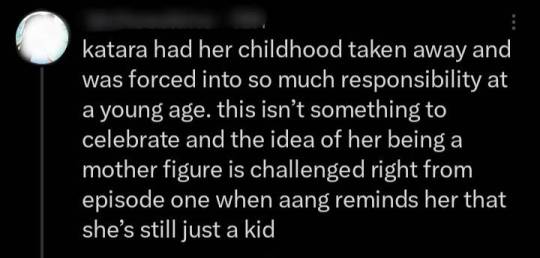
The idea of her being mother figure is challenged right from episode one when Aang reminds her that she's still just a kid.
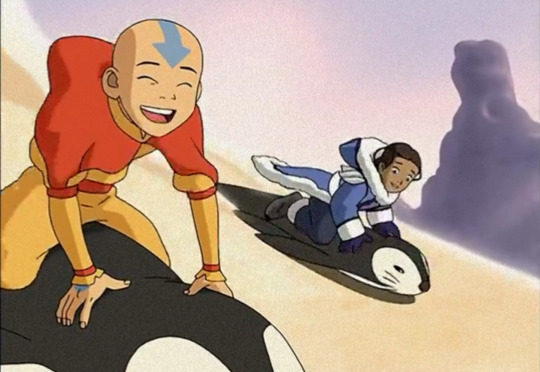
Okay, that's right! That's spot on! I don't deny that Aang makes Katara act like a child again for a while.
Aang reminds her that she's still just a kid.

Katara : Fire Nation. Sokka : We should tell him. Katara : [Yelling.] Aang! There's something you need to see. Aang : [Aang runs to them from the airball court, still playing with the hollow ball. Cheerfully.] Okay! Aang : [Happily runs up.] What is it? Katara : [Innocently holds her hands behind her back.] Uh... Just a new waterbending move I learned. Aang : Nice one! But enough practicing, [Excited as he turns around and start walking away.] we have a whole temple to see! Sokka : [Brushes the last of the snow from his head and shoulders.] You know, you can't protect him forever.
It's only the third episode, but Aang's childish attitude already makes Katara act like a mother protecting her child from reality. Katara also has to calm Aang down when he goes into avatar mode, it happens several times like it's her responsibility to do so.
Aang reminds her that she's still just a kid.
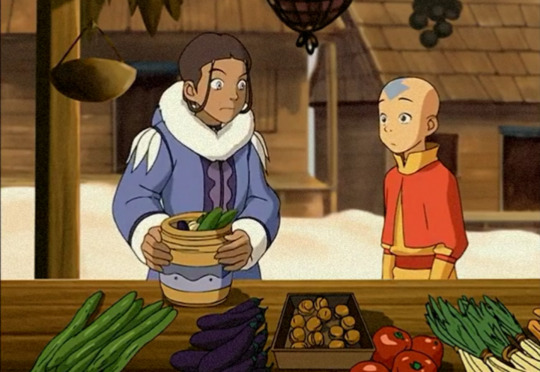
Katara : [Resumed filling the pot with more vegetables.] Watching you show off for a bunch of girls does not sound like fun. Aang : [Disappointed.] Well, neither does carrying your basket. Katara : [Annoyed.] It's not my basket. These supplies are for our trip. I told you, we have to leave Kyoshi soon.
This scene actually piss me off, like, if I were Katara I would mad too! And again, Aang's irresponsible and childish behaviour forced Katara to be responsible for doing the chores. If not her to be mature, who else? Sokka who is busy with his misogyny towards the Kyoshi warriors? Or Aang who is busy having fun with his fans?
Aang reminds her that she's still just a kid.
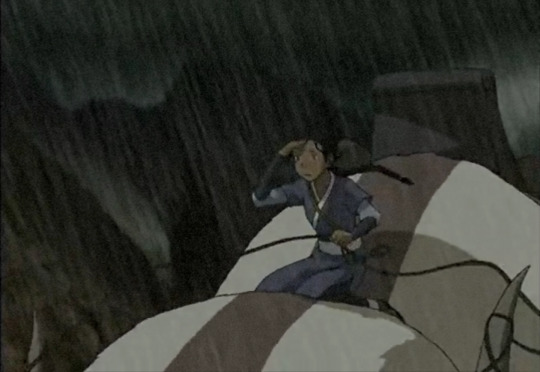
Aang ran away after someone blamed him for something he actually did a hundred years ago. Katara must find him in the storm, then help him dwelling with his past.
And it happens again in The Awakening. Aang runs away and triggers Katara's another trauma that forces her to grow up, which is being abandoned by the person she cares about (her father). Katara (Sokka and Toph) must find him and save him.
Aang reminds her that she's still just a kid.
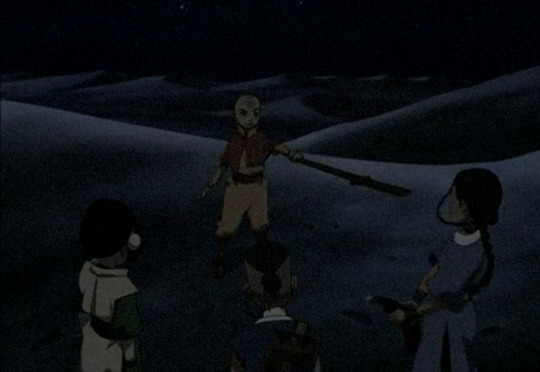
Katara : [Disappointed.] Wow... there's hardly any in here. Aang : [Lashes out.] I'm sorry, okay! It's a desert cloud; I did all I could! What's anyone else doing?! [Pointing his staff at Katara.] What are you doing?! She returns his attack with a shocked look on her face. Katara : Trying to keep everyone together. Let's just get moving. We need to head this direction.
Katara is the only one who can keep the Gaang out of the desert. If she doesn't act mature and responsible with the Gaang, they might not survive. And what does Aang do? Get mad at her for losing Appa, while Katara is not to blame for it.
Aang reminds her that she's still just a kid.
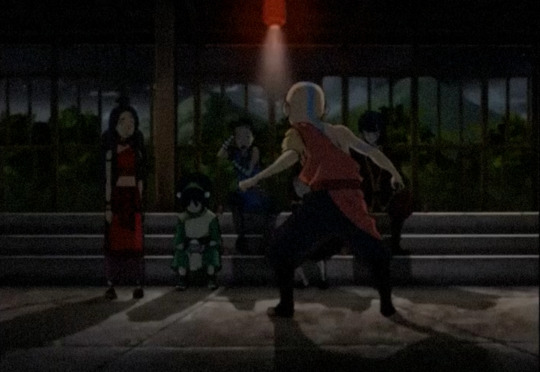
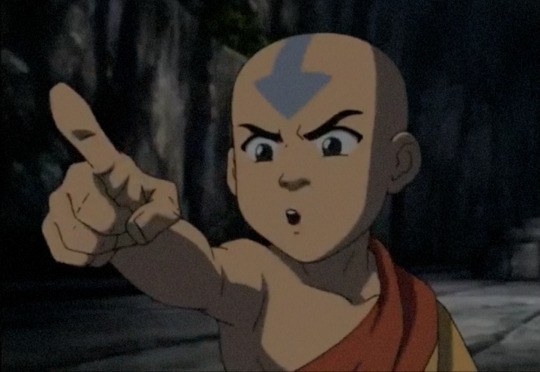
Katara : Aang, we do understand. It's just ... Aang : Just what, Katara? What? Katara : We're trying to help! Aang : Then, when you figure out a way for me to beat the Fire Lord without taking his life, I'd love to hear it! [Walks away.] Katara : Aang, don't walk away from this. [Walks toward Aang.]
I love Katara, you know, that's why I really don't like Aang pointing angrily at Katara and blaming her every time he got emotional, when Katara didn't do something wrong and just wants to help him. Is this a healthy relationship?
Aang reminds Katara that she's just a child in the first episode, but unfortunately, the Gaang (especially Aang) once again forces Katara to be motherly in the next episodes.
Does she like being motherly? No, she doesn't. She wants to have fun too, but if she did, the Gaang would be screwed. Being motherly is not just her nature, but the Gaang (except Suki) forces her to be more mature than the others narratively.
Actually, that's why I like the idea of Momtara and Dadko. In my opinion, this nickname is not to make her forget she is just a kid. Instead, because the narrative itself always shows Katara forced to act motherly toward Gaang, 'Momtara and Dadko' shows that is not only Katara's responsibility to do all chores.
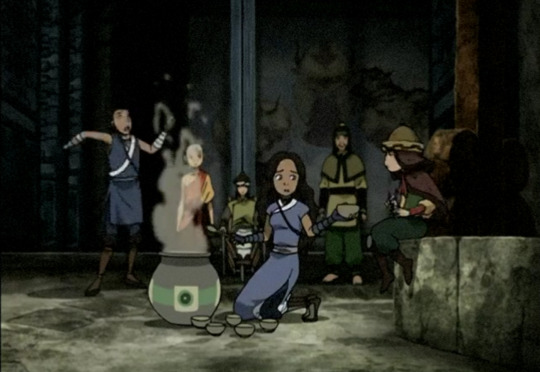
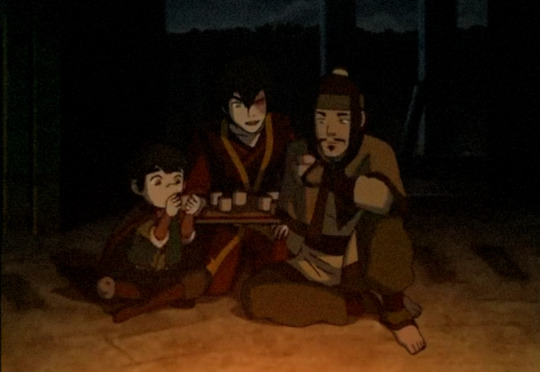
Calling Zuko Dadko is also reasonable, because he is narratively more mature among the Gaang (except Suki). He focuses on Aang's training and worries that Aang will fail, just like what father usually do to his son.

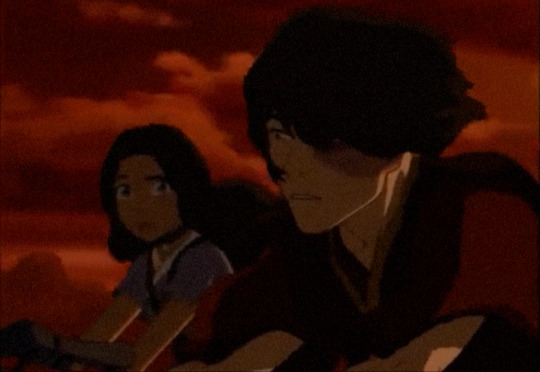
More than that, Katara doesn't need to act motherly with Zuko - he is the one bringing her things and preparing what they need in their journey contras with what Aang did in Kyoshi Island. And they act more like equal partners toward each other, rather than mother and son.
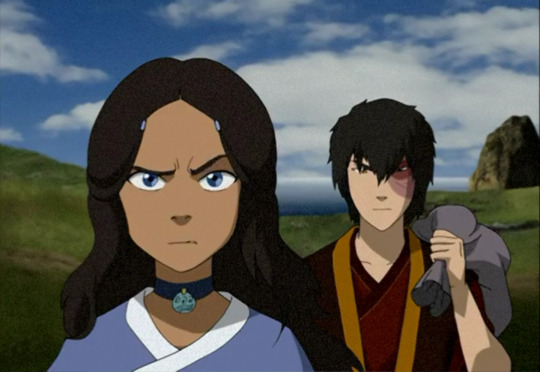
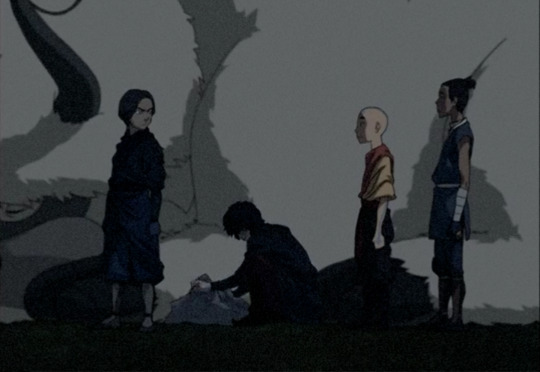
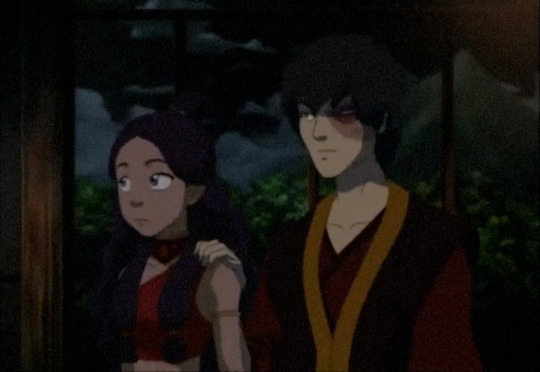
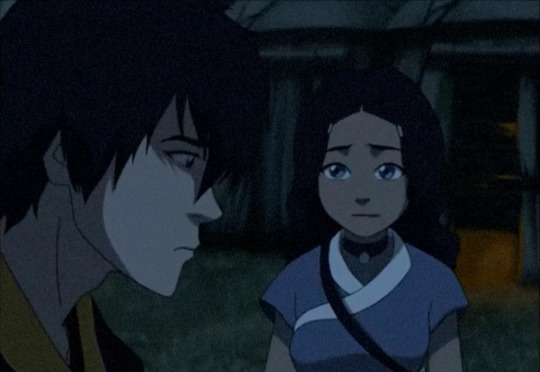
Oh, it's true that Aang makes Katara child again in first episode. But it's weird to defend Kat/ang and hate the narrative of Katara being motherly at the same time, when the Gaang (especially Aang) often forced Katara to act motherly.
#zutara#pro zutara#anti anti zutara#anti kataang#anti bryke#aang critical#atla critical#momtara and dadko
684 notes
·
View notes
Text
What I adore about the idea of Katara ending up with Zuko instead of Aang is that in Zuko she would have someone who would support her in her righteous anger. Had he been there when Katara challenged Pakku for her right to learn how fight, he would've backed her up. He would never have tried to tell Pakku that she didn't mean it. And he would've offered to help her dispose of his body if it came to that.
That's the energy that Katara needs. Someone who understands that she's not jumping into a fight for nothing. If she kills someone, she had a darned good reason.
926 notes
·
View notes
Text
the reason why i'll never take the argument that "fire lady katara disempowers katara" seriously is because in canon she is reduced to being aang's wife and the mother of his children, which actively disempowers her and a lot of the fics i've read with the fire lady katara headcanon have her being involved in politics which demonstrates that for the most part, zutara shippers care more about empowering katara than -GUNSHOTS.
#zutara#fire lady katara#katara#pro katara#katara defense squad#katara deserved better#anti kataang#anti bryke
623 notes
·
View notes
Text
Something I find interesting is that even though Bryke reduced Katara to a mom and a healer, they couldn't even do that right.
Katara is a mom. What was her relationship like with her kids? How did her kids feel about her? Was she a good mom? Who knows? Bryke didn't care enough to address it. Everything about her kids revolves around Aang and his bad parenting. What about her grandkids? Well she has no relationship with them. They barely know her.
Katara is a great healer (instead of great waterbender). Are we shown how great her skills have gotten? Nope! She fails every time she tries to heal someone on-screen just to show how bad the affliction is.
So Katara was there to serve as a trophy wife and baby machine for Aang, and once she served that purpose, Bryke didn't give a damn about her. She has no known accomplishments in her adult life (banning bloodblending doesn't count because it didn't accomplish anything). And after Aang dies, she's just a sad, lonely widow.
375 notes
·
View notes
Text
I know that a big part of Sokka's arc was to become a leader and he obviously proved that he can be one

But look at my girl Katara. She's exactly like her dad

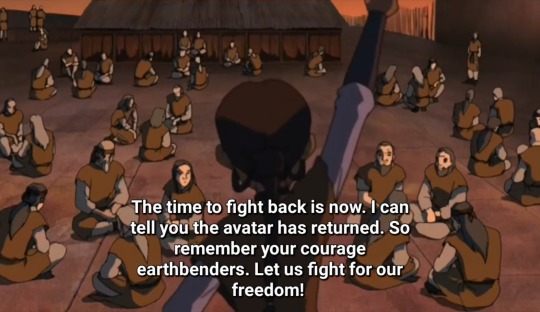
She was born to lead. She went out of her way to prove that she can be known for more than healing and she just ended up being recognized as one





She is also a master waterbender, but I guess that's not important enough to get a statue

705 notes
·
View notes
Text
Aang could't accept Katara's rage in Southern Raiders because it was a mirror to his own.
Aang is rather in a good mood for the entirety of the show for a kid that had just lost everyone they'd ever loved, and had his home and culture be destroyed by genocidal maniacs.
I don't believe for a second that he'd dealt with his grief in any sort of way (in fact, we even know that he'd just transferred all of his longing to Katara), and as such there must be a lot of grief and rage suppressed in him.
Along comes Zuko, and reminds Katara of her own well of feelings in that regard, and she - as opposed to Aang - does not suppress them.
Another genocide survivor who had a beloved parent figure taken away from them states their anger, and (between the lines) even desire for retribution - feelings that Aang was careful to not allow, so as to be positive, and chipper, and not drown in the despair of a lonely traumatized kid.
So he doesn't accept those feelings within himself, and neither does he accept them in Katara. ALL of it has to stay bottled up. All of it. Especially within Katara, lest his dam against grief breaks.
#anti kataang#zutara#anti aang#it is not really anti aang I am actually sorry for him but I don't want to engage with strange people#mine#southern raiders
334 notes
·
View notes
Text
"You can like Zutara without disliking Aang" Sure I can. But why do I have to?
I think I'm justified in disliking Aang. "He has good traits" If someone treats their partner poorly, it is very well justified to not like them, and even if they are a nice person to everyone else but their partner. That's even worse.
Aang violated Katara twice during the show. "He's 12" But she was 14. That is a VERY good reason to not like him. If this was any other show, you would never let it slide. But because he's 12 and squishy, it's okay. But what about Katara? Are you forgetting the person he hurt?
The way he treats her in their married life is insane too. People forget Aang grew up to be an adult but don't hold him accountable because he's the Avatar.
Also, "Katara could never hate Aang" but why couldn't she? If a friend of mine were to kiss me without my consent, am I not allowed to hate him for what he did because he's nice? If a writer were to write Katara to hate Aang it would be logical. It would be her full right to. He violated her.
#avatar the last airbender#anti kataang#katara#anti aang#anti bryke#aang critical#zutara#zuko x katara#zuko
404 notes
·
View notes
Text
Look I know people love to act like Zuko is the most dangerous, toxic, and temperamental character… but there is exactly one (1) male character Katara was canonically responsible for calming down from violent, destructive tantrums at risk to herself and it wasn’t Zuko… 🐸☕️
#another overlooked toxic trope tbh#zutara#atla#zuko#katara#aang critical#anti kataang#canon critical
1K notes
·
View notes